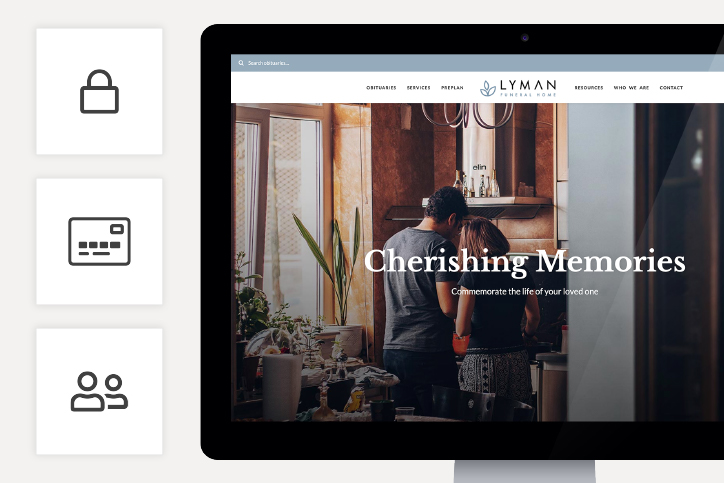Over the next few weeks, join us for a crash course on the traits of a website that’s in the right decade. This week’s topic is website security. If you missed the previous topics, click here for part 1 and here for part 2.
We have security systems to protect our homes and businesses and safes to secure sensitive documents and prized possessions. But what about our virtual information and files? With 43% of cyberattacks targeted at small businesses, your funeral home needs to protect yourself online, as well.
Out-of-date websites aren’t secure, but new websites protect your sensitive information! Let us help take care of website security, so you can focus on what matters most: caring for the families you serve. Below, we’ll go over some website security tips and how Frazer can help.
Interested in updating your website? Click here to request a free demonstration!
Protect Your Funeral Home’s Website with a Secure Sockets Layer (SSL) Certificate
When you break it down, an SSL certificate isn’t as complicated as it sounds. It simply encrypts the data sent through your website. This way, your staff’s and client families’ information is safe. For example, it protects information like credit card and social security numbers, login credentials, and other sensitive data.
To know if a website is secure or not, just look at the beginning of the URL. If it begins with HTTP, it isn’t secure. While if it starts with HTTPS, it’s secure. In case you’re curious what all this means, HTTP stands for hypertext transfer protocol. HTTPS is this same phrase with the “s” standing for secure. For example, here’s what the link to our SSL-protected website looks like: https://web.frazerconsultants.com
Website security is a top priority for our team. That’s why every single website we design is secured with an SSL certificate to keep your vital information and files safe.
Give Your Funeral Home’s Client Families Peace of Mind
Families are already under a lot of stress when coping with the loss of a loved one and funeral planning. By giving them a secure website connection, they can have one less thing to worry about. They don’t need the added stress of wondering if their information is safe.
When you have an SSL-secured website, families can enter their personal information with peace of mind. Whether they’re entering their credit card number for the funeral payment or applying for your funeral financing program, they have the comfort of knowing their information is safe. They trust you with caring for their loved one, and with a secure website, they also can trust you with keeping their personal information protected.
Boost Your Funeral Home’s Search Engine Optimization (SEO)
Having an SSL certificate also boosts your SEO. Search engines like Google prefer websites that are secure, so it can help you rank higher on search engine results pages (SERP). The higher your SERP ranking, the more likely potential client families will click on your funeral home’s website. Even moving up one ranking spot can make a huge difference. According to an analysis by Backlinko, on average, moving up even just one spot on a SERP increases your website’s click-through-rate by 30.8%.
Browsers like Google Chrome are making it obvious when your website isn’t secure, which can hurt your SEO. If your website isn’t safe, they’ll show users a message letting them know that it isn’t secure. This can cause potential client families to leave your website and go to a competitor’s website instead.
Don’t let your website get missed. By having an SSL certificate, families will see you have a secure connection. With the bonus of a higher SERP ranking, you can potentially rank higher than your competitors.
Not sure if your funeral home’s website passes the test? Download our free checklist to find out!





It’s unfortunate that not every website is trustworthy and secure, but don’t let that keep you from going online – just do it safely! Simply being able to recognize a safe website can go a long way to help protect your personal data. A legitimate trust seal, “https,” a privacy policy, and contact information are all good signs that a website is safe!